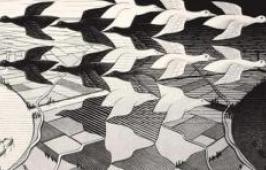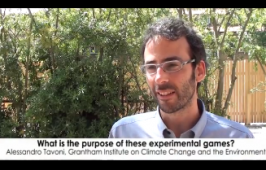Experiments
Experimental economics resorts to controlled experiments to assess the outcome of a given treatment, much like in medical studies. Experiments may be conducted in the field or in laboratory settings, generally with the goal of determining the drivers of individual or group behaviour. Data collected in experiments are used to estimate effect size, test the validity of economic theories, and shed light on the functioning of market mechanisms. Economic experiments usually use financial incentives to motivate subjects (often drawn from the student population). Given that decisions in the experiments are payoff-consequential, it is hoped that behavior in the experimental games will be consistent to that observed under real-world incentives. Controlled experiments vary significantly in their goal and scale, but always rely on repeatable procedure and logical analysis of the results based on treatment differences.
Related posts
|
Article Many public goods cannot be provided directly by interested parties (e.g. | READ MORE ... |
Working paper An investigator is interested in arbitrarily approximating a subject’s latent | READ MORE ... |
Working paper This paper reports on laboratory experiments on the formation of partnerships | READ MORE ... |
|
Article In the context of school choice, we experimentally study how behavior and | READ MORE ... |
Working paper We study the incentive effect of firing threats when bosses have limited | READ MORE ... |
From theory to application This paper compares three different incentive structures to see how they | READ MORE ... |
|
From theory to application People often behave more socially oriented when their actions are observable by | READ MORE ... |
Article We design a laboratory experiment to investigate matching in a decentralized | READ MORE ... |
Working paper We study a finitely repeated public goods game (based on the voluntary | READ MORE ... |
|
Working paper We experimentally study the emergence of networks under a known external threat | READ MORE ... |
Article Policy interventions are generally evaluated for their direct effectiveness. | READ MORE ... |
Working paper An information aggregation problem of the Condorcet Jury Theorem is considered | READ MORE ... |
|
Article The paper analyzes the role of the structure of communication—i.e. who is | READ MORE ... |
Article It is commonly perceived that increasing incentives improves performance. | READ MORE ... |
From theory to application If exchange of a good between a buyer and a seller generates a surplus, it is | READ MORE ... |
|
Article Uncertain outcomes are an inevitable feature of policy choices and their public | READ MORE ... |
Working paper Payoff calculators provide a source of information about subjects’ decision | READ MORE ... |
Working paper Just like soldiers crossing a bridge in sync can lead to a catastrophic failure | READ MORE ... |
|
Article With a laboratory experiment, we study the impact of buy-options and the | READ MORE ... |
Article Network formation among individuals constitutes an important part of many OR | READ MORE ... |
Working paper In a polarized committee, majority voting disenfranchises the minority. By | READ MORE ... |
|
Working paper We study whether coordination failure is more often overcome if players can | READ MORE ... |
Working paper We use laboratory experiments to study the causal effects of favorable and | READ MORE ... |
Working paper In a two-stage elimination math contest participants aged from 10 to 16 compete | READ MORE ... |
|
Working paper We show that the existence of gender differences in performance is highly | READ MORE ... |
Article In an experiment with more than 500 participants we study how past experience | READ MORE ... |
Article As societies are increasingly concerned with risks, it is important to evaluate | READ MORE ... |
|
From theory to application Coordination is a vital element of human life, whether it be greeting each | READ MORE ... |
Working paper We introduce a new game to the experimental literature and use it to study how | READ MORE ... |
Working paper We report on a laboratory experiment based on a stylized model of decentralized | READ MORE ... |
|
Article Coordination problems resembling weakest-link games with multiple Pareto ranked | READ MORE ... |
Working paper The aim of this paper is twofold. Starting from the population dynamics | READ MORE ... |
Working paper In many areas of social life, individuals receive information about a | READ MORE ... |
|
Article We conduct a laboratory experiment with a constant-sum sender–receiver game and | READ MORE ... |
Working paper The provision of global public goods, such as climate change mitigation and | READ MORE ... |
Working paper The stardom system characterizes creative industries: the demand and revenues | READ MORE ... |
|
Book "A beautiful dozen. Twelve papers presented in 20 years of meetings of the | READ MORE ... |
Interview In the field of climate change mitigation, a growing interest in social and | READ MORE ... |
Working paper The paper analyzes the role of the structure of communication - i.e. who is | READ MORE ... |
|
Working paper We conduct a laboratory experiment to study how, after a history of decay, | READ MORE ... |
Working paper We study the effectiveness of leaders for inducing coordinated organizational | READ MORE ... |
Working paper We consider a cheap-talk setting that mimics the situation where an incumbent | READ MORE ... |
|
Working paper We elicit reciprocal preferences in a firm-worker gift-exchange setting and | READ MORE ... |
Article This paper studies the implementation of quotas in matching markets. In a | READ MORE ... |
Article We present simple one-shot distribution experiments comparing the relative | READ MORE ... |
|
Article We consider a two-player contest model in which breakthroughs arrive according | READ MORE ... |
Article We investigate experimentally ingratiatory behavior expressed by opinion | READ MORE ... |
Working paper This study presents, motivates, and illustrates the use of a computational | READ MORE ... |
|
Working paper Minority reserves are an affirmative action policy proposed by Hafalir (2013) | READ MORE ... |
Working paper Internet is a very attractive technology for experiments implementation, both | READ MORE ... |
Working paper Fairness emerges as a relevant factor in redistributive preferences in surveys | READ MORE ... |
|
Working paper We study experimentally how the ability to communicate affects the frequency | READ MORE ... |
Working paper We provide experimental evidence of workers’ ingratiation by opinion conformity | READ MORE ... |
Working paper Many Social Interactions display either or both of the following well | READ MORE ... |
|
Working paper The subjective expected utility (SEU) criterion is formulated for a particular | READ MORE ... |
Working paper Understanding individual and social decisions and how they are affected by the | READ MORE ... |
Working paper Existing experimental research on behavior in weakest-link games shows | READ MORE ... |
|
Working paper Using an experiment, I compare the use of the ‘Beer Distribution’ classroom | READ MORE ... |
Working paper In this paper we experimentally investigate whether partial coercion can in | READ MORE ... |
Working paper We conduct an experiment to study how imperfect knowledge of the state space | READ MORE ... |
|
Working paper Pairwise stability (Jackson and Wolinsky, 1996) is the standard stability | READ MORE ... |
Working paper |
Working paper Experimental and behavioral economics are well established branches in the eco | READ MORE ... |
|
Working paper In this paper, we expose the results of a voting experiment realised in 2007, | READ MORE ... |
Working paper We conduct a repeated VCM (voluntary contribution mechanism) experiment using | READ MORE ... |
Working paper We report in this paper the result of three experiments on risk, ambiguity and | READ MORE ... |
|
Working paper We study experimentally how players learn to make decisions if they face many | READ MORE ... |
Working paper In this paper, we compare the cause and effect of immaterial rewards and | READ MORE ... |
Working paper We experimentally study the influence of local information conditions on elite | READ MORE ... |
|
Working paper Substantial evidence has accumulated in recent empirical works on the limited | READ MORE ... |
Working paper We study a static model of principal-multiple agents with hidden actions (moral | READ MORE ... |
Working paper This paper reports on a laboratory experiment which investigates the impact of | READ MORE ... |
|
Working paper While markets are often decentralized, in many other cases agents in one role | READ MORE ... |





